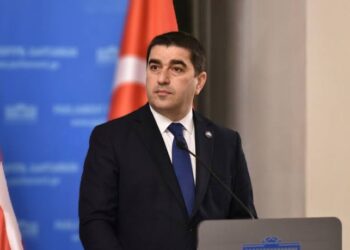In the fierce competition between the Western and anti-Western axes – which is further complicated by the so-called peculiar behavior of the Global South – our partners should remember that there is virtually no geopolitical “vacuum” left in the world. In other words, as soon as one military-political grouping lessens its focus on a particular country or region, its rival immediately takes over the vacated space. Today, such substitution has become particularly easy due to information warfare and so-called gray operations, as well as the promotion of growing ethno-nationalism and authoritarian populism.
This is why (and not only) the current debate in US political and analytical circles about a rational foreign line requires a balance between the so-called “internationalism” and “conservatism” so that the interests of the US and its partners are not harmed. The “audit” we have mentioned aims at both theoretical and practical solutions to this very complex problem. We will not bore the reader with conceptual theses and on the basis of various sources we will characterize the American foreign policy revised at the intersection of “primacy” and “prioritization” as follows:
(1) Maintaining active participation in global processes and close cooperation with partners;
(2) A deterrent military capability that would make anyone reconsider open aggression not only against the country but also its partners due to the expected dire consequences – the so-called “deterrence by denial”
(3) Realignment of the international order, including by increasing the capacity of international institutions. In the same context, resuscitating the role of the UN Security Council and neutralizing the “veto trap”;
(4) Proactive diplomacy – in exchange for the so-called “endless wars”; At the same time –
(5) The rejection of “endless wars” does not mean nullifying the role of military force, but rather using it with reasonable self-restraint, when and in a way that is unavoidable and serves understandable, acceptable and realistic goals;
(6) Greater flexibility in the implementation of economic enforcement measures, including the implementation of the so-called “smart sanctions”.
Which line the Americans will develop, this or another, we will obviously see in the not-too-distant future. Here it should be taken into account that it is difficult to accurately predict current events. However, certain contours are already emerging, which gives Georgia’s foreign office and other political institutions an opportunity to observe, analyze and properly react to them. How well we fulfill this task is a big puzzle in itself. We have already talked about the necessary conditions and principles of its realization many times and will not overload this article with their repetition.
Let us now briefly address a couple of relevant sub-questions of the topic discussed above.
Trump “repeatedly” and the expected changes?
Donald Trump’s second presidency is being awaited by everyone with some inexplicable excitement. This is not surprising since the 2017-2021 version of Trump was actually charismatic. At the same time, it is pretty hard to say with certainty that the “second version” of President Trump will be a replica of his first presidency. Most likely – no. And the reason for this is not only in the current US, but also in the global root processes. By the way, there is no single assessment of the policies associated with Trump’s first presidency, and the direction of foreign policy at the time has several different explanations.
There is virtually no doubt that the 2024 US presidential election is about more than just the personality of the White House occupant. Much more is expected here, namely the clarification or redefinition of the “national interests” of this global player. And this is so important because the US “national interests” have and will continue to have a great influence on the system of international relations.
Here, we intentionally leave out two aspects:
(1) The chance of Trump winning the election due to the inclusion of Kamala Harris in the presidential race;
(2) Trump’s possible influence on Georgia’s domestic and foreign agenda: due to “using” the issue by the Georgian political spectrum for power and narrow partisan purposes.
Thus, we will mention, with a few remarks, the changes in the foreign policy of this country expected as a result of the election of Donald Trump as President of the United States, which also deserve Tbilisi’s attention.
First, there is the question of the depth and content of such changes. The fact is that even today the core of the Republican Party (as well as the current Republican faction in the Senate) is made up of neoconservatives and supporters of the “primacy” we mentioned. It is clear that the balance of power within the party may change, but the status of this event is exactly as we have described it here.
Second, it should be said that Donald Trump looks at world politics and relations largely through the eyes of a businessman. Accordingly, for him, “partnership” relations with a country are measured by geo-economic rather than geo-strategic factors. In other words, the economic benefit and practical function of a particular country will be central to his administration. It is worth noting that while discussing the security and competitiveness of our country, we have repeatedly discussed the role of such a function and goal for Georgia, its relevance and the need for constant renewal.
Third, Trump’s (like his two predecessors) “enthusiasm” for economic coercive measures in foreign relations, be it sanctions, control over technology exports, the US dollar as the world currency, tariffs, etc., to some extent should be taken into account by us, especially against the background of sharply deteriorating Georgian-American relations.
Fourth, it is likely that in geopolitically traditional geographies for the US (Europe, the Middle East, the Korean Peninsula), Trump will attempt (to the extent possible) to shift the burden of security and the balance of power to local actors. The direction of the People’s Republic of China is the only one where compromise is less likely. Against the background of the recent intensification of Georgian-Chinese relations, naturally, this aspect is relevant for us.
Of course, the factors highlighted in this part of the article have many offshoots and modifications. Moreover, this list is not exhaustive to fully characterize the US foreign policy and the Trump’s influence on Georgian-American format. However, we believe that these notes also provide official Tbilisi with sufficient material for an in-depth judgment and an adequate response.
Post Scriptum: The widespread talk about expectations for Donald Trump’s re-election is no accident: Trump is unusual as a person and a politician. That will prepare the world for a surprise if he returns to the White House. We have already talked about this and other aspects in some detail. We believe that the presidency of Kamala Harris promises us no fewer discoveries. This view stems from a deficit in the current perception of Harris as a prominent political figure, as well as her modest activism in the foreign arena.
Indeed, the contours of foreign policy during the Harris presidency are now difficult to predict. However, given the content of this article – drawing on a variety of sources and assessments – we felt it necessary to create a brief “CV card” of the Democratic presidential candidate’s various key themes. Specifically:
(a) China: Harris’s policy presumably will not be particularly different from Biden’s. She will continue to strengthen alliances in Southeast Asia and favor a line of cooperation and competition in US-China relations. What is particularly noteworthy here is how the new US industrial (in practice protectionist) policy and the so-called “Tariff War” will continue. It is also likely that China’s influence in the region will continue to be counterbalanced by deepening relations with India, which – along with geopolitical considerations – will be facilitated by Harris’s background;
(b) Trade: As noted, the protectionist line established during Biden’s presidency will largely be maintained. Emphasis is also likely to be placed on limiting the influence of monopolies and protecting intellectual property.
Here, we will add that the attitude of a possibly “democratic” White House to free trade agreements of special interest to Georgia is very vague.
(c) Middle East: Israel’s security will not lose relevance. However, more attention will be paid to the humanitarian side of the process, especially with regard to the condition of the Palestinians.
However, within this very peculiar “equation,” it is unlikely that the security of the Jewish state will lose its traditional priority for US policy. It should also be taken into account that Harris’s husband is Jewish, which, although indirectly, will still have a certain load.
(d) The Russian-Ukrainian war, perhaps the most notable issue for Georgia in Harris’s approach. Especially since the ongoing war in Ukraine has equally become an integral component of both external Georgian and internal Georgian politics.
Judging by the statements made so far, the likelihood of Harris’ “tolerance” for Russia’s aggressive policy is practically zero. At the same time, the unity and further strengthening of the North Atlantic Alliance remains the cornerstone of the declared policy of the Democrats.
It is clear that this brief summary is completely insufficient to create a complete picture of future processes, but it does provide some insights – for us and for our region.
Who should we talk to? Who should we “deal” with?
Of course, the formation of US foreign policy is a multidimensional process involving various institutions and centers of influence. Thus, the answer to the question of who Georgia should talk to in the heart of our strategic partner is banally simple: to everyone.
At the same time, it is impossible not to emphasize the public or non-public side of American foreign policy, where, despite the wide participation, different actors have different weight. In this regard, the role of the US president should be mentioned in particular. Emphasizing this role is logical not only as a natural extension of what was said above in the article, but also given the conditions of the undoubtedly outstanding influence that the presidential institution undoubtedly has in the development and implementation of the country’s foreign policy.
This outstanding feature is the result of many decades and is characterized by many stages and milestones in its development. It is obviously impossible to recount this story within the scope of this article, and that is not our goal. We will, however, focus specifically on two recent court cases that focus on the greater autonomy of the US president’s role in foreign policy. Both cases concern President Trump, one involving the possible unauthorized use of classified files at the Florida state level and the other at the US Supreme Court level in the Trump vs. United States dispute in criminal prosecutions over the scope of the former president’s immunity after the presidency expires.
Let’s leave out the details and focus only on some of the findings of the United States Justice that resonate with the issue of the discourse in this article. Specifically, the court categorized presidential powers as follows:
(a) Authorities within the “core of his official duties” during which the president enjoys “absolute” immunity;
(b) Authorities in “outer perimeter of his official repsonsibilities” where presidential immunity is “presumptive”; and
(c) Authorities in “unofficial activities” where immunity does not exist, but there is one inconvenient “but” related to the difficulty of drawing a clear distinction between “official” and “unofficial” activities.
This approach by the justice, which does not limit the rights of the president, has led to the notion of an “imperial president” in US analytical circles, with US Supreme Court Justice Sotomayor referring to “a president above the law” in her dissenting opinion.
We will leave the discussion of legal nuances to legal experts. It only remains to note that the recent questioning of the president’s role indicates a further increase in his influence on foreign and security policy. This is another signal for official Tbilisi and something that needs to be comprehended, especially when in Georgian circles we hear rather irresponsible statements about the US domestic political or electoral process. The thing to remember here is that the political system of the West, and the US in particular, is not as businesslike as some of us imagine and would like it to be.

We, they, and we together…
We will begin this part of the article with the words of the prominent Georgian diplomat Alexander Chikvaidze: “A small country cannot afford the luxury of making a big mistake.” Indeed, this very simple phrase contains both a profound content and an urgent appeal in terms of shaping Georgian policy.
And the attitude of certain political circles in Georgia towards external (as well as internal) issues serves not only to overturn modernity, but also to overturn our historical past and rewrite it in “obscure handwriting”.
The current situation, however, equally demands, on the one hand, a correct assessment of the adversary, since relations with it best reveal one’s own weaknesses, and, on the other hand, appreciation of the partners, since their uncompromising assessments are the best measure of true support. Understandably, it is not easy to realize this in practice, but at the same time it is extremely necessary for the implementation of “Georgia’s policy of realistic possibilities”.
From the perspective of Georgian policy, a number of challenges arise in connection with our partners. Moreover, the genesis of these challenges cannot be attributed to the Georgian side alone. In order to keep the main line of this article, let us briefly say this: one of the main tasks of Georgia’s foreign and domestic policy is to ensure that the country not only does not fall out of the priorities of our Western partners, but also that it becomes more established among them in the process. According to the latest Pew Research poll in the United States, the picture in this regard is not particularly encouraging. The fact is that, speaking of “spheres of influence,” only 50 percent of respondents considered reducing Russian influence to be a foreign priority for the United States, which indicates a borderline sentiment in society.
However, speaking about the geographies of “primary” and “peripheral” interests, it is necessary to constantly remind our partners: marginalization (even unintentional) of a country of such importance as Georgia as a “periphery” ultimately damages the unified and integral security system in the format of global geopolitical competition.
Here, we would add that in today’s world we are not required to subordinate Georgian politics to strict moralistic criteria. It would be much better that the effectiveness of such politics in a specific context is also determined by the appropriateness of specific actions (in this sense, for example, Israel of the 1950s and 1960s offers us “best practices”). And another controversial consideration: it is not always possible to find the right and consistent balance between modernizing one’s own system on the one hand and democracy on the other. Here, too, rational prioritization is essential, and when the balance is broken, it should be restored as soon as possible. A “policy of realistic possibilities”, in which the art of forced compromise is an organic part of an effective policy, should be oriented towards this result.
It is an inexorable law of geopolitics: avoiding a greater evil often leads to a lesser one; the space between “good” and “bad” has narrowed considerably. Today this policy is called pragmatism in “international jargon”. It has openly taken its place among the large and medium-sized actors, and it is time for Georgia to start adopting this approach, especially in light of such challenges, whose management according to our interests does not always achieve a match between “goal” and “ideal”, and one or another decision or step is explained by some tactical consideration at the given moment.
A number of historical precedents demonstrate tactical expediency without abandoning strategic objectives. For example, the category of pragmatic compromises includes the West’s alliance with the USSR, the US-initiated “breakthrough” with China in 1970 to break the alliance between the USSR and the People’s Republic of China, or the use by many Western countries of the undemocratic regimes of many third countries for Cold War purposes.
It is likely that at this stage of history and for the foreseeable future, Western politics will continue to be guided by “tactical” considerations. It is clear that the handwriting – “the end justifies the means” – cannot meet the spirit of idealism, but the goal, very difficult against the background of authoritarian or hybrid regimes of the Eurasian space, cannot be achieved otherwise. All the more so if it is to be achieved only according to standardized, publicly declared norms, with “white gloves”.
The combination of factors mentioned in this and the previous article is quite remarkable from the point of view of building an effective Georgian policy and appropriate environment. This is the world of new standards into which our partners have entered. Now it is our turn: to learn and properly implement these new standards in time to realize Georgian and our common interests.
Op-Ed by Victor Kipiani, Geocase Chairman














